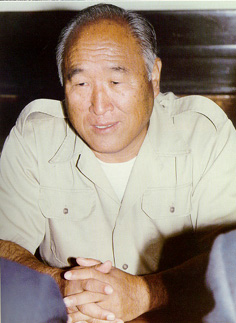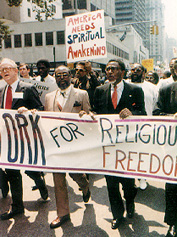Suffering in Danbury Prison
* THE FEDERAL PRISON IN DANBURY, CONNECTICUT.
Just before beginning his sentence Reverend Moon stated that he was innocent of any crime and merely the victim of the misuse of the power by the authorities. That he was, however, willing to go to prison for the will of God who is to raise America from spiritual death. He declared that he had hope in America that there could be a revival of morality and the realization of one world, centering on the United States, under God.
We can know the true character of a man through observing him under difficult circumstances. In prison, Reverend  Moon was praying for his enemies, longing for
the blessing and salvation of thousands of future generations. Washing dishes and doing cleaning chores in the prison
cafeteria, Reverend Moon shed his sweat, exerting his best effort to transform the given situation into one that could bring
glory to God.
Moon was praying for his enemies, longing for
the blessing and salvation of thousands of future generations. Washing dishes and doing cleaning chores in the prison
cafeteria, Reverend Moon shed his sweat, exerting his best effort to transform the given situation into one that could bring
glory to God.
Four Honorary Doctorates
Reverend Moon had previously received an honorary doctorate in law from Ricker College, Maine, on December 9, 1975, and during his time in Danbury Prison he received four further honorary doctorates. The first was awarded by La Plata University, affiliated with the Catholic church, in Argentina on November 15, 1984, and the second, on May 11, 1985, was conferred by the Shaw Divinity College, affiliated with the Methodist Church. The third doctorate, awarded on May 28, 1985, was from the Bible Theological Seminary of the State of Florida, and the final one was awarded by Vennard College on August 15, 1985.
 The chancellor of La Plata University conferred the honorary degree of Doctor Honoris
Causa at the United Nations Headquarters, traveling all the way to the United States despite
objections from the Vatican. This was an expression of respect for Reverend Moon's deep
compassion toward nations of the third world and in particular for his support, as a religious
leader, of anti-colonialist policy. The chancellor of Shaw Divinity College, who granted Reverend Moon an honorary doctorate in law,
said, at the awards ceremony, that even if their theology differed from that of the Unification Church, the award was based on the
personal achievements of Reverend Moon. Reverend Moon's struggle for the freedom of religion in America, his fight against
communism, and his dedication-greater than anyone else's-to preventing the corruption of human society, was being recognized
through the conferment of the honorary degree.
The chancellor of La Plata University conferred the honorary degree of Doctor Honoris
Causa at the United Nations Headquarters, traveling all the way to the United States despite
objections from the Vatican. This was an expression of respect for Reverend Moon's deep
compassion toward nations of the third world and in particular for his support, as a religious
leader, of anti-colonialist policy. The chancellor of Shaw Divinity College, who granted Reverend Moon an honorary doctorate in law,
said, at the awards ceremony, that even if their theology differed from that of the Unification Church, the award was based on the
personal achievements of Reverend Moon. Reverend Moon's struggle for the freedom of religion in America, his fight against
communism, and his dedication-greater than anyone else's-to preventing the corruption of human society, was being recognized
through the conferment of the honorary degree.